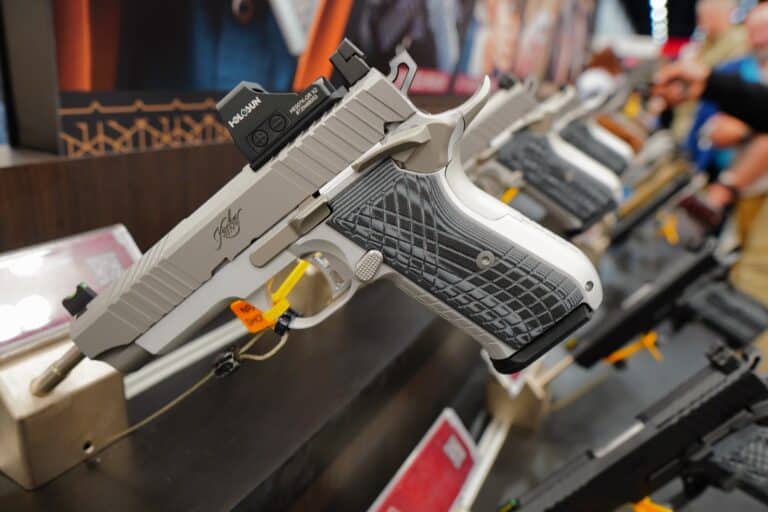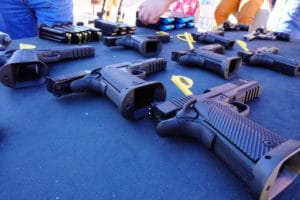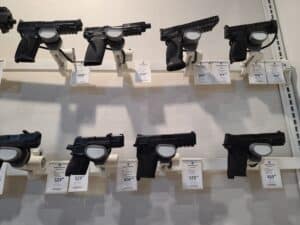Israelis are currently arming themselves for reasons and at a level likely recognizable to most Americans, but the Middle Eastern nation’s approach to civilian gun ownership draws a stark contrast to our own.
Simcha Rothman, Chair of the Israeli Knesset’s Constitution, Law, and Justice Committee, revealed this week that 150,000 Israelis have applied for handgun permits since Hamas’s October 7th attack on the country. But his exclusive interview with The Reload also revealed a number of differences–and some similarities–between how guns are viewed in Israel and the United States.
Many differences can be found in how each country regulates firearm ownership. And those stem from competing philosophical starting points. Unlike the United States, gun ownership is not considered a right in Israel, and there is no written guarantee to keep and bear arms in the country’s founding documents.
“So, it’s not an issue of a human right,” Rothman told The Reload. “But I know the discourse in the US, how do you read the Second Amendment? Is the reason for the right the need for a militia or the other way around? I’m not getting into this discussion in the US, but we know about it.”
Instead, the ability to own a gun is predicated on meeting a series of government conditions. Up until October 7th, Rothman said the most common way to qualify for a handgun permit was to live in a part of the country the government views as especially dangerous.
“The main cause, until now, in numbers was living in an eligible community or a place or working there or learning there, studying there,” he said. “So, if you’re a resident of a municipality or a community, community or a town that because of its location is eligible. Some rural places or places in Judea and Samaria, where there are more threats on the roads. Some places like this, then you’re eligible. You still need to meet some other standards.”
Rothman said that meant a background check and an age limit.
“It’s the basic standard, you need to show that the government agency checks before giving you the license,” he said. “It checks your criminal background and your health background. If you don’t have a mental illness, or some other illicit prevents you from holding a gun.”
That’s similar to the process for buying a gun in the United States. However, the Israeli process is more difficult to pass, and the age to buy handguns is set at 27 instead of 21. Additionally, once you are approved to buy a gun, you can only own one. And it must be registered with the government for your exclusive use.
“If you have a permit for a gun then you can buy it, and it’s also a specific match. It’s a numbered gun that is connected to you,” Rothman said. “You cannot have any gun. It’s registered and one per person. You cannot have dual ownership, and you cannot have one person holding two. It’s one per one.”
And that gun can only be a pistol.
“It’s all handgun. Usually, you cannot have a personal private license for a rifle,” Rothman said. “There are some exceptions. There are a few who are using special guns. If you have a hunting permit, or if you have Olympic firearms, but it’s very rare. That’s not worth mentioning. So, you get the license for your rifle for the hunting. Then you also get the handgun. So, you’ll have two or three, but that’s basically it. The handgun that you get for your own protection, this is one per person.”
Limiting civilians to one handgun for protection stands in stark contrast to how many Jewish Americans have responded to the October 7th attacks. While they too have turned to firearms for protection as some protests in America and around the world have turned from support for Palestinians to support for Hamas and their slaughter, American Jews have focused on more capable firearms. The AR-15 has become a popular option for those looking to protect themselves from similar attacks in the United States.
“I had three or four calls today that were, ‘Hey, which AR-15 should I buy?” Rabbi Yossi Eilfort, president of the Jewish security non-profit Magen Am, told The Reload last month.
Ross, who works at a software company in the Chicago suburbs and asked not to be identified over security concerns, summed up the American view of what kind of arms it would take to effectively prevent a terror attack.
“I think what we saw in Israel is that if you have a group of people that are determined to come into your home and commit harm, first of all, if you don’t have a gun, good luck,” he said. “And, even if you have like a little pistol, sorry to say, that’s not gonna cut it. I’m planning on purchasing more firearms at this point.”
Rothman said about a million Israelis qualify for handgun permits under the dangerous-regions policy. However, he also noted that a majority don’t take advantage of that eligibility. He said men were far more likely to get a pistol permit than women–another similarity with the United States.
“Of course, most of them do not apply. It’s not very common, for example, in Israel, for women to apply. It’s not that they are not eligible. They’re eligible. I know myself and in spite of where I live, a lot of women carry guns, but it’s not very common,” Rothman said. “So, out of the million, of course, half of them are women, and most of them will not apply.”
He also pointed out another difference between US and Israeli gun culture. While gun ownership and military service is strongly linked in America, it is even more so in Israel. That’s because military service is required for most people in Israel. And that means more civilians understand how to handle a firearm than the number of people eligible for private gun ownership might suggest.
“Keep in mind that in Israel, unlike the US, many, many people are serving in the army because it’s mandatory,” Rothman said. “And, also, many people serve in the reserve units. So, they do go to basic training and know how to use weapons. So, in a time of need. like now, we can have a strong reserve force in a short period of time. So, it’s not like an unarmed population that don’t know anything about guns.”
The nation’s leaders are hoping to capitalize on that firearms experience in the wake of October 7th as it faces down ongoing terrorist attacks and an all-out ground war with Hamas. In addition to calling up reserves from all over the world, Israel has expanded lifetime handgun permit eligibility to more combat veterans than ever before.
“It used to be if you were a combatant, to a certain degree in the infantry, you would be able to get even if you live in other places,” Rothman said. “Now, it was added that if you were a combatant it doesn’t matter where you were a combatant. Not only in the high-level infantry. Every past combatant now in Israel is eligible. This has now became, I think, the largest group. But that’s new. That was just added now.”
Despite the many differences in regulatory approach, there are many similarities in how Israelis and Americans view the utility of those civilians who are armed. Rothman said the government has also been increasingly friendly toward law-abiding civilians arming themselves. And he said armed civilians have been instrumental in preventing or stopping previous attacks.
“In the past, law-abiding citizens with handguns stopped and prevented many terrorist attacks in Israel,” he said. “There are many, many terrorists that were killed on the site by law-abiding citizens carrying a gun. They didn’t wait for the law enforcement. That saved many, many people. So, every spike in terror was always bringing motivation.”
Additionally, American and Israeli views on gun carry match up in a number of ways. Most American states, though not all, have moved to a permitless carry system that’s similar to the one in Israel. If you can own a pistol, you can carry it.
“We don’t have special permits for this and that,” Rothman said. “In Israel, there is no different concealed carry. It’s not a thing.”
In fact, he said Israelis are generally expected to carry a handgun if they are given a permit to own one. He noted open carry is also allowed, as it is in most American states. Only brandishing with the intent to threaten people is illegal.
“You can walk around, and people will see that you have a gun,” Rothman said. “You can’t show your gun in a threatening way, but you can walk with it.”
But, as in America, most gun owners prefer to carry concealed for tactical reasons.
“You don’t have to conceal it, but most people will have it under their shirt or something like that because they don’t want everyone to see that they have a gun or to be an easy target for someone to try to take it away from you or to attack you,” he said. “So, most people carry it on their person, but it’s concealed.”
So, the differences between American and Israeli gun cultures are stark. But similarities also exist and, likely, many more than in most other countries that all but completely ban civilian gun ownership. It will be worth watching to see which direction Israel’s gun culture evolves from here. Will it move more toward the American exception or the global norm?







Only Members can view comments. Become a member today to join the conversation.